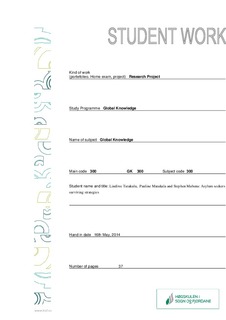Asylum seekers surviving strategies
Student paper, others
Permanent lenke
http://hdl.handle.net/11250/279912Utgivelsesdato
2014Metadata
Vis full innførselSamlinger
Sammendrag
This research was a quest to learn, understand and analyze the survival strategies available to asylum seekers in Sogndal Norway, with intent to contribute to the knowledge base for future research. The research also tried to look at the services provided by Government to the asylum seekers and evaluate the impact the same services had on the life of asylum seekers. This, therefore, meant that the study required a literature review, interviews and meeting respondents. These were undertaken. It called for ethical consideration, professionalism and openness on the part of both the respondents and the researchers. The research used an in-depth type of interview which engaged both the respondents and researchers to open up more and dig out the required information. The study for the research was forecast on the asylum reception center based at Kaupanger of Sogndal and covered a period of one year, from 2012 to 2013.
The research findings revealed that the asylum seekers spent most of their time in social gatherings where they met with people of different nationalities had meals, shared and received support from one another as a means of survival strategy. Others clang to religion and met with members of their respective religion as also a means of survival strategy. For most women whose answers came out negative from the Government, they were forced to look for odd jobs as their allowances had reduced. Over and above the research revealed that the asylum seekers had no economical survival strategies availed to them because the Norwegian Policy does not provide for employment of asylum seekers. However, the asylum seekers are only helped by Government through its agency called LOPEX which advances some allowance in the form of cash fortnightly as well as provide guidance for intergration into the Norwegian Society. The study brought out survival strategies apparently at the disposal of asylum seekers in Kaupanger, Sogndal. The research made some discussions and recommendations that may help in assisting the asylum seekers with their survival strategies; it further gives other means of suggestions of how the asylum seekers could be improved while living in their reception centers.
Beskrivelse
GK 300
Global Knowledge
16th May, 2014
